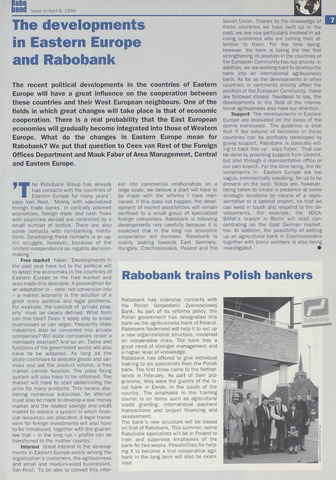The developments
in Eastern Europe
and Rabobank
T
Rabobank trains Polish bankers
Rabo
band Issue 6/April 6, 1990
The recent political developments in the countries of Eastern
Europe will have a great influence on the cooperation between
these countries and their West European neighbours. One of the
fields in which great changes will take place is that of economie
cooperation. There is a real probability that the East European
economies will gradually become integrated into those of Western
Europe. What do the changes in Eastern Europe mean for
Rabobank? We put that question to Cees van Rest of the Foreign
Offices Department and Mauk Faber of Area Management, Central
and Eastern Europe.
he Rabobank Group has already
had contacts with the countries of
Eastern Europe for many years',
says Van Rest. 'Mainly with specialized
foreign trade banks. In centrally planned
economies, foreign trade and cash flows
with countries abroad are controlled by a
small number of bodies. There are also
some contacts with non-banking institu-
tions. Developing these contacts is an up-
hill struggle, however, because of the
limited independence as regards decision-
making.'
Free market Faber: 'Developments in
the past year have led to the political will
to adapt the economies in the countries of
Eastern Europe to the free market and
also made this desirable. A precondition for
an adaptation to - note: not conversion into
- a market economy is the solution of a
great many political and legal problems.
For example, the concept of 'private prop-
erty' must be clearly defined. What form
can this take? Does it apply only to small
businesses or can larger, frequently state
industries also be converted into private
companies? Will state companies retain a
monopoly position? And so on. Tasks and
functions of the government sector will also
have to be adapted. As long as the
state continues to allocate goods and ser
vices and set the product volume, a free
market cannot function. The price fixing
system will also have to be reformed. The
market will have to start determining the
price for many products. This means abo-
lishing numerous subsidies. An attempt
must also be made to develop a real money
market and the related savings and credit
market to replace a system in which finan-
cial resources are allocated. A legai frame-
work for foreign investments wiil also have
to be introduced, together with the guaran-
tee that - in the long run - profits can be
transferred to the mother country.'
Interest Great interest in the develop
ments in Eastern Europe exists among the
organization's customers, the agribusiness
and smail and medium-sized businesses.
Van Rest: To be abie to convert this inter
est into commercial relationships on a
large scale, we believe a start will have to
be made with the reforms I have men-
tioned. If this does not happen, the devel-
opment of market possibilities will remain
confined to a small group of specialized
foreign companies. Rabobank is following
developments very carefully because it is
expected that in the long run economie
cooperation will increase. Rabobank is
mainly looking towards East Germany,
Flungary, Czechoslovakia, Poland and the
Soviet Union. Thanks to the knowledge of
these countries we have built up in the
past, we are now particularly involved in ad-
vising customers who are turning their at-
tention to them. For the time being,
however, the bank is taking the line that
strengthening its position in the countries of
the European Community has top priority. In
addition, we are working hard to develop the
bank into an international agribusiness
bank. As far as the developments in other
countries or continents directly affect the
position of the European Community, these
are followed closely. Needless to say, the
developments in the field of the interna
tional agribusiness also have our attention.'
Support The developments in Eastern
Europe are evaluated on the basis of the
points mentioned. 'The guideline is then
that if the volume of business in these
countries can be profitably developed by
giving support, Rabobank is basically will
ing to back this up', says Faber. 'That can
be done by providing support from Utrecht,
but also through a representative office or
our own branch. For the time being, the de
velopments in Eastern Europe are too
vague, commercially speaking, for us to be
present on the spot. Steps are, however,
being taken to create a presence at some
strategie locations by means of a repre
sentative or a special project, so that we
can keep in touch and respond to the de
velopments. For example, the ADCA-
BANK's branch in Berlin will start con-
centrating on the East German market,
too. In addition, the possibility of setting
up an agricultural bank in Czechoslovakia
together with Unico partners is also being
investigated.'
Rabobank has intensive contacts with
the Polish Gospodarki Zywnosciowej
Bank. As part of its reforms policy, the
Polish government has designated this
bank as the agribusiness bank of Poland.
Rabobank Nederland will help it to set up
a new organizational structure, modeiled
on cooperative lines. The bank has a
great need of stronger management and
a higher level of knowledge.
Rabobank has offered to give individual
training to six specialists from the Polish
bank. The first three came to the Nether-
lands in February. As part of their pro-
gramme, they were the guests of the lo-
cal bank in Eerde, in the south of the
country. The emphasis in the training
course is on items such as agricultural
credit granting, international payment
transactions and project financing and
assessment.
The bank's new structure will be based
on that of Rabobank. This summer, some
Rabobank specialists will be in Poland to
train and supervise employees of the
bank for two weeks. Possibilities for help
ing it to become a true cooperative agri-
bank in the long term wiil also be exam-
ined.

